英汉对比与翻译-英汉词义对比
英汉语言对比与翻译

“It is the meaning of a message that is transferred from one language to another, and the transfer is accomplished by analyzing and then reconstructing semantic relationships.”1 “Translation can therefore be defined as the operation by which the relevant signification of linguistic signs is determined through reference to a meaning as formulated in a message, which is then fully reconstructed in the signs of another language.”2 1、2. Delisle, J. Translation: An Interpretive Approach[M]. Eng. trans, by Logan. P & Creery. M., Ottawa: University of Ottawa Press, 1980: 3;52
翻译中英汉语言对比的重要意义 Nhomakorabea就保留原文句法与译文体现原作精神的问题,傅雷也有精辟的论述:“假如破坏本国文字的结构与特性,就能传达异国文字的特性而获得原作的精神,那么翻译真是太容易了。不幸那种理论非但是刻船求剑,而且结果是削足就履,两败俱伤。” 1
01
怒安. 傅雷谈翻译[M]. 沈阳:辽宁教育出版社2005:2
关于英汉语言的比喻
陈安定:英语句子好比“一串珍珠”,而汉语句子则像“一盘大小各异的珍珠,散落玉盘,闪闪发光,灿烂夺目。”1
英汉翻译(5) 英汉词义对比与选词
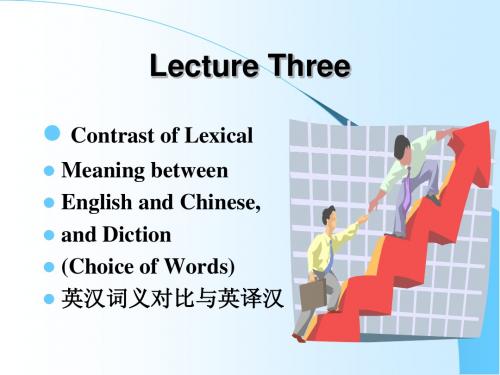
helicopter 直升飞机 manliness 男子气 incense coil 盘香 aside 旁白
b. inclusion(涵盖关系)
Mainly including those words whose meanings have extensive and narrow separations. Examples: marriage 嫁、娶 gun 枪、炮 sister 姐、妹 morning 早晨、上午
B. refractive(折射式) indirect reflection of objects e.g. bird C. integrative(整合式) combination of the meaning of two words. E.g. flexitime” (弹性工作制,始于英国) 铁饭碗 (a secured job)
1. a round post 一根圆柱 2. The wheels go round rapidly. 车轮飞转。 3 . The night watchman makes his rounds every hour. 夜班人员每小时巡视一次。
1 . The students stood round the teacher. 学生围站在老师的周围。 2. We rounded the Cape of Good Hope. 我们饶过了好望角。
II. According to context and collocation
1.It was a girl with good manners. 这是一位举止得体的姑娘。 2.These were all labeled as good eggs. 这些都被标为新鲜的鸡蛋。 3.Dogs are often regarded as man’s good friends. 狗经常被认为是人类的忠实朋友。
左彪-英汉对比与翻译(全)

Two Types of Transfer
• Negative Transfer (负迁移) Errors arise from analogy. 类推会产生错误。 • Positive Transfer (正迁移) Errors decrease by analysis. 分析能减少错误。
We could turn negative transfer (interference) into positive (facilitation) by making analysis on differences between the two languages and arouse the learner‟s awareness of avoiding or reducing errors from analogy. 我们可以通过分析两种语言的差异,提高学生避免 或减少类推错误的意识,把负迁移(干扰)转化为正迁 移(促进)。
人在阵地在。 The position will not be given up so long as we are still living. 人无远虑, If one has no long-term considerations, 必有近忧。 he will find trouble at his doorstep.
English-Chinese Contrast and Translation 左飚
英 汉 对 比 与 翻 译
English-Chinese Contrast and Translation
左 飚
上海建桥学院 上海海事大学 zuobiao212@
欢迎光临
英 汉 对 比 与 翻 译
Chinese
Lacking inflection in the strict sense 缺少严格意义的 形态变化 老师们、同学们 我的爸爸、你的妈妈 认真的态度、 认真地学习
英汉词汇对比翻译论文
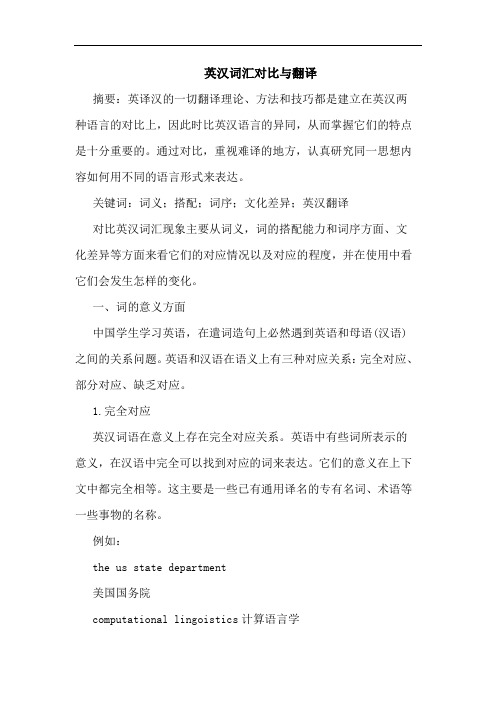
英汉词汇对比与翻译摘要:英译汉的一切翻译理论、方法和技巧都是建立在英汉两种语言的对比上,因此时比英汉语言的异同,从而掌握它们的特点是十分重要的。
通过对比,重视难译的地方,认真研究同一思想内容如何用不同的语言形式来表达。
关键词:词义;搭配;词序;文化差异;英汉翻译对比英汉词汇现象主要从词义,词的搭配能力和词序方面、文化差异等方面来看它们的对应情况以及对应的程度,并在使用中看它们会发生怎样的变化。
一、词的意义方面中国学生学习英语,在遣词造句上必然遇到英语和母语(汉语)之间的关系问题。
英语和汉语在语义上有三种对应关系:完全对应、部分对应、缺乏对应。
1.完全对应英汉词语在意义上存在完全对应关系。
英语中有些词所表示的意义,在汉语中完全可以找到对应的词来表达。
它们的意义在上下文中都完全相等。
这主要是一些已有通用译名的专有名词、术语等一些事物的名称。
例如:the us state department美国国务院computational lingoistics计算语言学the pacific ocean太平洋2.部分对应一个概念,在两种语言中,局部处于一个平面上,但更多的局部,却处在两个平面上。
我们经常对英语这种多平面体系缺乏足够的认识。
试举introduce和“介绍”一例来剖析:let mcintro-dueemyself(请让我自我介绍)。
这个局部概念上,intreduce 和“介绍”处在一个平面上,是对应的。
因为“介绍”的意思是“从中沟通,使双方相识”;introduce的意思是cause to be acquainted,两者的内涵吻合在一个平面上。
问题在于英语的introduce与汉语的“介绍”两者并不完全对应,这就为我们造成了困难。
例如“市、县官员向他介绍了它们的机构对塌方事件进行联合调查的进展情况”。
hewas briefed bycity andcounty officials0ntheprogressofthejointinvestigationbytheiragencies intothe cave-in.此句中的“介绍”就不能用introduce,因为在这一情景中,英语概念的内涵不是一般化的“从中沟通,使双方相识”,而是具体化的to give detailed information to而表达这一特定的内涵,用动词brief比较普通。
第三章 张春柏 汉译英 英汉词汇对比与翻译

第三章:英汉词汇对比与翻译英汉两种言分属印欧语系和汉藏语系,英语是拼音文字,汉语是表意文字,两者之间存在着很大的差异。
这种差异首先反映在词汇上。
与翻译关系比较密切的因素主要包括词义、词形、和词的音律和节奏等。
3.1英汉语的词义对比与翻译说到翻译,人们自然会想到词的选择。
有人以为手持一本英汉词典和一本汉英词典就可以翻译了。
这是一种非常幼稚的想法。
这不仅是因为翻译牵涉到诸多非语言因素,如文化知识和科学常识等,而且还因为英语和汉语和词汇之间本身就有着很大的差别。
这种差别首先表现在词义上。
英国语言学家利奇把最广义的意义划分为七种不同的类型:外延意义、内涵意义、社会意义、情感意义、反映意义、搭配意义和主题意义。
除了主题意义外,其他六种意义都与词义密切相关。
显然,词典告诉我们的主要是词的外延意义,如“土地”、“红色”、和“荷花”在英语中分别为earth、 red和 lotus flower,而它们的其他意义则不大可能作全面的反映。
可以毫不夸张地说,除了科技词汇外,英语和汉语中几乎没有两个词在所有的意义和用法上是完全对等的。
具体而言,英汉词汇在意义上主要有以下区别:1 词汇的意义范围(semantic scope)不一样,如英语中的kill 一词和汉语中的“杀”就相去甚远。
例如:1 Japanesekilled millions of innocent people during the war.army在那场战争中日本军队屠杀了成百上千万无辜的平民。
2) Three men were killed in the accident.有三个男子在事故中丧生。
3) The engine was killed by the flood.汽车的引擎由于大水而熄了火。
4) Your joke nearly killed me.你的笑话真是笑死人。
5) I’m reading this book just to kill time.我读这本书只是为了消磨时间。
英汉词语的对比与翻译

增补译法
(1) The equipment should enter production in 2000 with first deliveries being made in 2001. (2) The project has been considerably speeded up. (3) According to the U.S. Commerce Department, the United States foreign debt swelled to $ 263.3 billion in 1986, up from $ 111.9 billion in 1985. (4) The purpose of engineering is to create useful goods, to make them better, cheaper and more abundant. (5) Both the buyer and the seller are busy at negotiations of business, contract and draft. (6) A foreign trade staff must have a good foundation in economics, mathematics, statistics, accounting and intercultural communication.源自
(4) The purpose of engineering is to create useful goods, to make them better, cheaper and more abundant. 工程的目的是要创造有用的物品,使他们的质量更好, 价格更便宜,数量更充足。(语义搭配需要) (5) Both the buyer and the seller are busy at negotiations of business, contract and draft. 买卖双方正忙于交易磋商,合约谈判和汇票议付。 (6) A foreign trade staff must have a good foundation in economics, mathematics, statistics, accounting and intercultural communication. 一位外贸人员必须在经济学,数学,统计学,会计学 和文化交际等五个方面具有良好的功底。(增加范畴 词,表概括)
英汉翻译第4章(英汉对比)
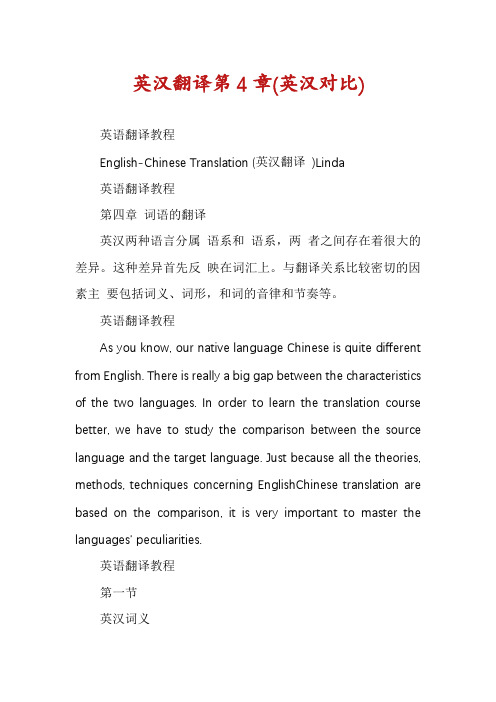
英汉翻译第4章(英汉对比)英语翻译教程English-Chinese Translation (英汉翻译)Linda英语翻译教程第四章词语的翻译英汉两种语言分属语系和语系,两者之间存在着很大的差异。
这种差异首先反映在词汇上。
与翻译关系比较密切的因素主要包括词义、词形,和词的音律和节奏等。
英语翻译教程As you know, our native language Chinese is quite different from English. There is really a big gap between the characteristics of the two languages. In order to learn the translation course better, we have to study the comparison between the source language and the target language. Just because all the theories, methods, techniques concerning EnglishChinese translation are based on the comparison, it is very important to master the languages’ peculiarities.英语翻译教程第一节英汉词义英汉词汇之间本身有着很大的差别,这种差别首先表现在词义上。
英国语言学家杰弗里 . 利奇在他的Semantics ( 语义学) 中把最广义的意义划分为7 种不同的类型:外延意义(概念意义)( denotative meaning )、内涵意义( connotative meaning )、风格意义( stylistic meaning )、情感意义( affective meaning )、联想意义( reflective meaning ) 搭配意义( collocative meaning )、主题意义( thematic meaning )。
英汉词汇语义对比与翻译

英汉词汇语义对比与翻译作者:王秋晓来源:《文学教育下半月》2019年第10期内容摘要:词汇是一种语言中所有的(或特定范围的)词和固定短语的总和。
作为一种语言的基本组成部分,词汇既是构成句子、段落乃至篇章的基础,也是语言这个庞大的系统耐以生存的支柱。
英语和汉语都含有丰富的词汇。
符号作为语言的载体,本身没有任何意义,只有被赋予含义的符号才能够在交际中使用,这样语言就转化为了信息,而语言的含义就是语义。
本文从英汉词汇语义现象出发,通过对英汉词汇语义进行对比和分析,探讨其相互之间的联系,并试图找出相应的翻译策略,为英汉词汇互译提供一些可行的方法和有益的启发。
关键词:词汇语义对比翻译策略一.引言我国著名的语言学家陈原先生曾说过:“语言中最活跃的因素——词汇常常最敏感地反映了社会思想和生活的变化。
作为人们表达的基础,词汇载录着一个民族丰富的文化信息,直接或间接地映射它所积淀的独特的文化蕴涵(陈原,1980)。
”在英汉词汇的对比研究中,语义对等的词汇并不鲜见,这使得英汉两种语言互译后,分别为以英语和汉语为母语的读者大体都能理解对方的语言所传达的含义。
然而,由于自然环境、思维模式和风俗习惯等不同而导致的文化差异,英汉两种语言中也存在着大量语义不对等的词汇,这就增加了翻译的难度。
因此,英汉词汇语义对比与翻译研究具有重要意义。
二.英汉词汇语义对比意义是什么?千百年来,语言学家们一直在寻找这个问题的答案。
在出现了人类、出现了人与人之间交流的需要、出现了用于交流的语言符号之后,才有了所谓的意义。
瑞士语言学家索绪尔将意指作用中用以表示具体事物或抽象概念的语言符号称为能指,而把语言符号所表示的具体事物或抽象概念称为所指,所指也就是意指作用所要表达的意义。
这说明,用来指意的东西(符号)和符号所指的东西是同一个事物的两个方面,它们相互依存、密不可分。
词汇是一套系统的符号,是符号蕴含的意义(语义)的载体。
19世纪,欧洲的比较学派研究了世界上近一百种语言,发现有些语言的某些语音、词汇、语法规则之间有对应关系和相似之处。
汉英词语比较与翻译

汉译英中的词义选择
• 1. 根据语境选择合适词义
• “Each word is a new word in a new context.” (Firth, British linguist)
• 例1:“好” • ①. 好的开始是成功的一半。 • Well begun, half done. • ②. 邻居对我都很好。 • My neighbors are all very kind to me. • ③. 这个问题好解决。 • The problem can be easily solved.
• ④. 计划定好了。 • The plan has been drawn up. • ⑤. 你留个电话,有事好联系你。 • Give me your telephone number so that I can contact you
when necessary. • ⑥. 今天下午好几个人过来找你。 • Quite a few people came in looking for you this afternoon.
• Fengshui • 阴阳
• Yin-yang • 馄饨
• Wonton
• 有些词语,采用直译,既可以使译文简洁,又能保留汉语 文化词语的原汁原味,不会产生文化误解。
• 易经 • Book of changes • 号脉 • Feel the pulse • 京剧 • Peking Opera • 龙舟 • Dragon boat • 春节 • Spring Festival • 站票 • Standing-room-only tickets
• 在直译无法达到效果的情况下,可采用意译。 • 意译法舍弃了词语的语言形式和字面意义,着眼于传
英汉对比与翻译-英汉词义对比

• • • • • • • •
蓝天白云 天高气爽 天下乌鸦一般黑 天字第一号 民以食为天 天庭 天涯 谋事在人、成事在天
• white clouds in a blue shy • The sky is clear and the air crisp. • All ravens under the sun are back. • Number one • Food the number one need of the people. • (the middle of) forehead • Horizon; the end of the world; the remotest place of the world
• 犬:dog, hound, • 走:walk, spaniel, mastiff, saunter, amble, pointer, setter, stride, trudge, retriever, terrier… shamble, prance, • carry: 搬、运、送、 scamper, clump, 提、拎、挑、担、 tiptoe … 抬、背、扛、搂、 抱、端、举、夹、 • 羊: sheep, 捧…… goat, ram, ewe, lamb…
• • • • •
物美价廉 cheap and good 个人主义 individualism/egotism 唯心主义 idealism 自由主义 materialism 红、黄、白
4)False friends ignorant of collocative meaning • 恶性循环 vicious circle • 恶性肿瘤 malignant tumor • 恶性通货膨胀 inflationary spiral/ galloping inflation • 恶性交通事故 grave traffic accident • 恶性贫血 pernicious anemia • 副(总统、经理、教授、司令、食 品、作用、标题) • Vice president deputy manager associate professor assistant commanding officer non-staple food side effect subheading
浅谈英汉对比与翻译
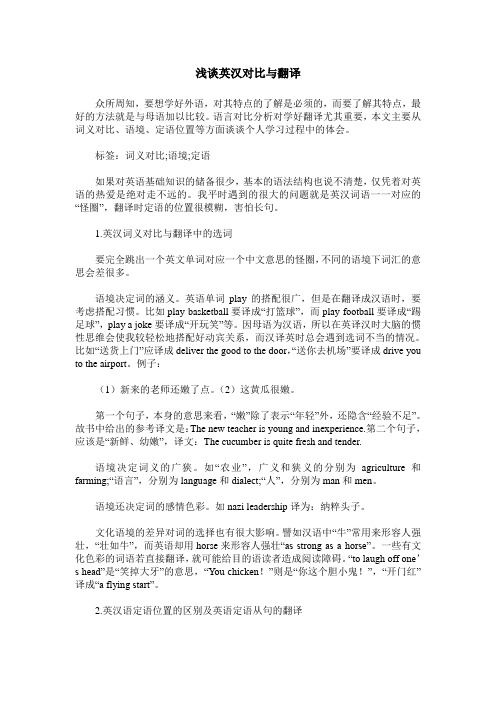
浅谈英汉对比与翻译众所周知,要想学好外语,对其特点的了解是必须的,而要了解其特点,最好的方法就是与母语加以比较。
语言对比分析对学好翻译尤其重要,本文主要从词义对比、语境、定语位置等方面谈谈个人学习过程中的体会。
标签:词义对比;语境;定语如果对英语基础知识的储备很少,基本的语法结构也说不清楚,仅凭着对英语的热爱是绝对走不远的。
我平时遇到的很大的问题就是英汉词语一一对应的“怪圈”,翻译时定语的位置很模糊,害怕长句。
1.英汉词义对比与翻译中的选词要完全跳出一个英文单词对应一个中文意思的怪圈,不同的语境下词汇的意思会差很多。
语境决定词的涵义。
英语单词play的搭配很广,但是在翻译成汉语时,要考虑搭配习惯。
比如play basketball要译成“打篮球”,而play football要译成“踢足球”,play a joke要译成“开玩笑”等。
因母语为汉语,所以在英译汉时大脑的惯性思维会使我较轻松地搭配好动宾关系,而汉译英时总会遇到选词不当的情况。
比如“送货上门”应译成deliver the good to the door,“送你去机场”要译成drive you to the airport。
例子:(1)新来的老师还嫩了点。
(2)这黄瓜很嫩。
第一个句子,本身的意思来看,“嫩”除了表示“年轻”外,还隐含“经验不足”。
故书中给出的参考译文是:The new teacher is young and inexperience.第二个句子,应该是“新鲜、幼嫩”,译文:The cucumber is quite fresh and tender.语境决定词义的广狭。
如“农业”,广义和狭义的分别为agriculture和farming;“语言”,分别为language和dialect;“人”,分别为man和men。
语境还决定词的感情色彩。
如nazi leadership译为:纳粹头子。
文化语境的差异对词的选择也有很大影响。
英汉词语对比与翻译

(3)幽默(humor)、引擎(engine)
(4)保健(health protection)支部
(branch) 5.术语: 整数、分数、元素 6.特殊用语(1)敬语:“令”、“贵”、 (2)谦辞:敝、愚、小、拙 7.简称(1)抽取法:支部书记- 书记;科学 技术——科技
(2)标数法
英语表示人的后缀按附加的语义可分为这几类:
1,表示人的某种职业 -an historian -ant merchant -ar scholar -eer engineer -ist pianist -or author 2,表示具有某种职务 -ain captain -al principal -arch monarch -ary secretary 3,表示来自某个地方的人 -er villager -ese Chinese
汉语的字和词有区别:
单音节语素:实语素和虚语素 多音节语素
汉语词汇包括基本词汇和一般词汇
基本词汇:词汇的核心部分,发展过程中变
化最稳定、应用最广泛、构成新词能力最强 的那些词:天、地、山、水、年、门等。 一般词汇:1.古语词:天子、诸侯、尚书 2.新语词:克隆、计算机、网络 3.方言:二流子、母猪 4.外来词(1)咖啡coffee、尼龙nylon (2)卡宾枪(carbine)香槟酒 (Champagne)
4,表示信奉或信仰某种主义者 -an repulican -crat bureaucrat 5,表示做某种动作对人 -al rival
-ant/ent agent -ard laggard 6,表示感情色彩 -aster 带有“小、臭、丑”等轻蔑意味 Poetaster (大油诗人) criticaster 低劣的批评家 7,表阴性
英汉对比与翻译(好)

English-Chinese Contrast and Translation
欢迎光临
A
1
A Chinese poem says, “A bosom friend afar brings a distant land near.”
海内存知己,天涯若比邻
Wishing you happiness every day!
对比研究着重寻找 语言间的不同点,运用 共时的研究方法。
A
17
语义型与形态型
A
18
Please translate the following:
不要人云亦云。 Don’t say what others have said. 这件事,你做也好,他做也罢,我看谁都做不好。 Whether you do the matter or he does it, I’m afraid neither
A
13
Examples of Negative Transfer
6. -- Your English is wonderful. -- Oh, no. My English is still poor. -- Your English is wonderful. -- Thank you, but I still have a long way to go before I really master it.
在有些中国方言(如南京/闽南方言)中没有辅音/n/或
/f/,而用辅音/l/或/h/来替代。
A
9
Examples of Negative Transfer
2、他一天只吃两顿饭。
He only eat two meal a day.
英汉语言翻译的比较
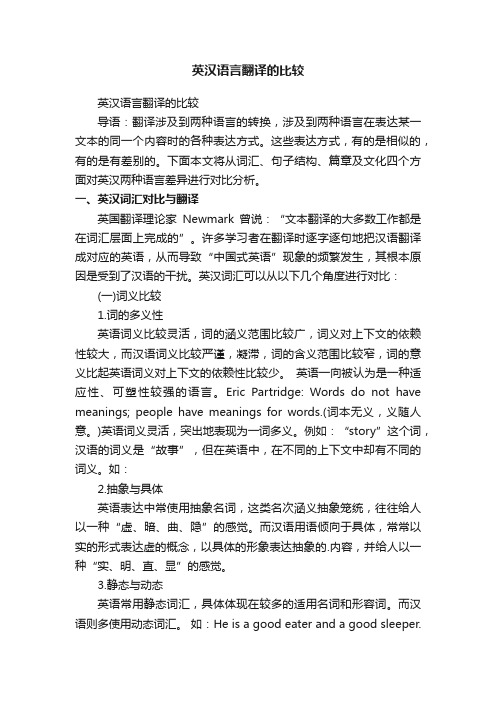
英汉语言翻译的比较英汉语言翻译的比较导语:翻译涉及到两种语言的转换,涉及到两种语言在表达某一文本的同一个内容时的各种表达方式。
这些表达方式,有的是相似的,有的是有差别的。
下面本文将从词汇、句子结构、篇章及文化四个方面对英汉两种语言差异进行对比分析。
一、英汉词汇对比与翻译英国翻译理论家Newmark曾说:“文本翻译的大多数工作都是在词汇层面上完成的”。
许多学习者在翻译时逐字逐句地把汉语翻译成对应的英语,从而导致“中国式英语”现象的频繁发生,其根本原因是受到了汉语的干扰。
英汉词汇可以从以下几个角度进行对比:(一)词义比较1.词的多义性英语词义比较灵活,词的涵义范围比较广,词义对上下文的依赖性较大,而汉语词义比较严谨,凝滞,词的含义范围比较窄,词的意义比起英语词义对上下文的依赖性比较少。
英语一向被认为是一种适应性、可塑性较强的语言。
Eric Partridge: Words do not have meanings; people have meanings for words.(词本无义,义随人意。
)英语词义灵活,突出地表现为一词多义。
例如:“story”这个词,汉语的词义是“故事”,但在英语中,在不同的上下文中却有不同的词义。
如:2.抽象与具体英语表达中常使用抽象名词,这类名次涵义抽象笼统,往往给人以一种“虚、暗、曲、隐”的感觉。
而汉语用语倾向于具体,常常以实的形式表达虚的概念,以具体的形象表达抽象的.内容,并给人以一种“实、明、直、显”的感觉。
3.静态与动态英语常用静态词汇,具体体现在较多的适用名词和形容词。
而汉语则多使用动态词汇。
如:He is a good eater and a good sleeper.他能吃又能睡。
4.构词法(1)英语主要构词法有派生、转化和合成三种,汉语主要有派生、转化、合成、重叠四种。
(2)英语派生可用于名词、动词、形容词等,汉语派生只用于名词。
(3)重叠是汉语主要构词法之一,英语则无重叠法。
英汉语对比与翻译

Comparison between English and Chinese vs. Translation
引子
There
isn’t much to live for in this jail of a house. He was open now to charges of willful blindness. 人不犯我,我不犯人。 我走在厚厚的地毯上,一点脚步声也没 有。 一匹马骑两个人。 他赢得起,输不起。 沉鱼落雁之容,闭月羞花之貌
3.
It
was a day as fresh as grass growing up and clouds going over and butterflies coming down can make it. It was a day compounded from silences of bee and flower and ocean and land, which were not silences at all, but motions, stirs, flutters, risings, fallings, each in its own time and matchless rhythm.
There isn’t much to live for in this jail of a house. (Charles Dickens) 住在这监狱一样的房子里,活着没有多大 意思。 My fool of a doctor told me to make my will. (John Galsworthy) 我那笨蛋医生叫我写遗嘱。
绿草萋萋,白云冉冉,彩蝶翩翩,
这日子是如此清新可爱;蜜蜂无言, 春花不语,海波声歇,大地音寂, 这日子是如此安静,然而并非安静, 因为万物各以其特有的节奏,或动、 或摇、或震、或起、或伏。
英汉词义对比及翻译
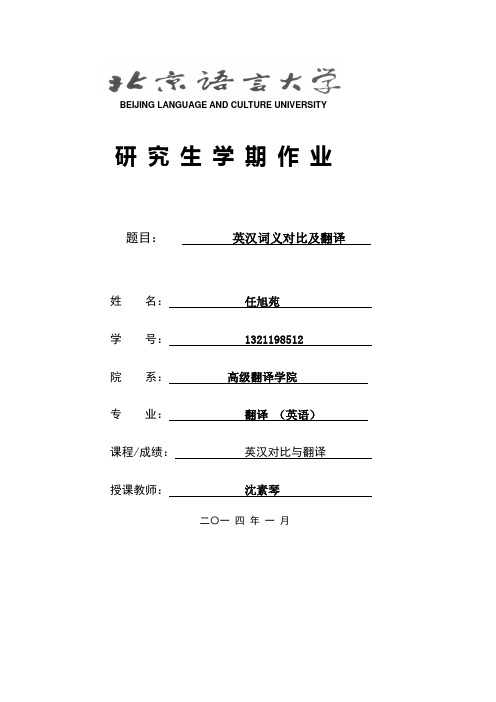
BEIJING LANGUAGE AND CULTURE UNIVERSITY研究生学期作业题目:英汉词义对比及翻译姓名:任旭苑学号: 1321198512 院系:高级翻译学院专业:翻译(英语)课程/成绩:英汉对比与翻译授课教师:沈素琴二〇一四年一月论文纲要一、英汉词义对比的意义二、英汉词义的语义关系1. 对应式2. 交叉式3. 冲突式三、英汉词语互译的基本规范1. 原则性2. 灵活性四、英汉词语互译的方法1. 增词法2. 减词法3. 词类转译法4. 正说反译和反说正译法五、结语英汉词义对比及翻译摘要:翻译不仅是简单的文字符号转换, 更是思维方式和观念系统的转换, 在这个转换过程中, 词汇作为最基本的语言材料, 对于准确翻译、完善表达起着举足轻重的作用。
由于英汉语言所涉及的具体社会和文化背景差异以及语言自身的特点,使得英汉词汇在语义方面存在着许多不相对应的情况。
本文着重分析英汉词义的差异以及差异产生的原因,并探讨英汉词义差异对翻译的影响,以期在翻译中有效地避免或解决词汇方面的误译或漏译, 提高翻译质量和翻译效果。
关键词:英汉对比词义翻译方法1. 词语翻译的意义在英汉或汉英翻译中, 正确理解原语的词义,并在译入语中选择恰当的词语是翻译过程中极其重要的环节。
但很多初学者往往把词汇意义等同于双语字典的释义, 翻译时常产生一种错误认识, 认为翻译就是英语和汉语之间进行的词汇替换。
这样就会出现翻译中虽然将所有的英语词语都译成对应的汉语, 可是整篇译文却不知所云或意义与原意差异巨大的现象, 这就说明翻译者对词义把握能力欠缺。
在英汉或汉英翻译中, 若要在原语与译入语之间找到一个完全对等的词语并非一件容易的事。
这主要是因为不同的语言中, 词义的构成不相同, 词汇的使用范围也不相同。
而更为复杂的是词义本身又是一个动态的、不确定的概念。
单词或词只有放在特定的语境中, 才能获得确定的意义, 即只有把词或词组放在一定的语篇中, 将其同一定的交际事件相联系, 它们才能完成传递信息的功能。
英汉词语对比与翻译【打印版】
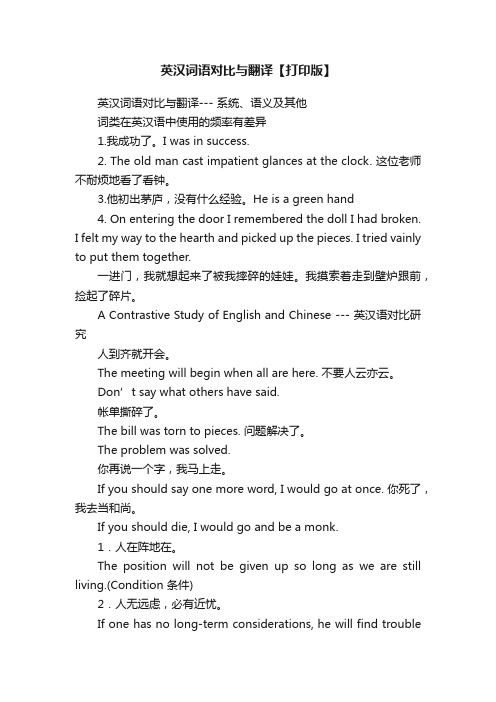
英汉词语对比与翻译【打印版】英汉词语对比与翻译--- 系统、语义及其他词类在英汉语中使用的频率有差异1.我成功了。
I was in success.2. The old man cast impatient glances at the clock. 这位老师不耐烦地看了看钟。
3.他初出茅庐,没有什么经验。
He is a green hand4. On entering the door I remembered the doll I had broken.I felt my way to the hearth and picked up the pieces. I tried vainly to put them together.一进门,我就想起来了被我摔碎的娃娃。
我摸索着走到壁炉跟前,捡起了碎片。
A Contrastive Study of English and Chinese --- 英汉语对比研究人到齐就开会。
The meeting will begin when all are here. 不要人云亦云。
Don’t say what others have said.帐单撕碎了。
The bill was torn to pieces. 问题解决了。
The problem was solved.你再说一个字,我马上走。
If you should say one more word, I would go at once. 你死了,我去当和尚。
If you should die, I would go and be a monk.1.人在阵地在。
The position will not be given up so long as we are still living.(Condition 条件)2.人无远虑,必有近忧。
If one has no long-term considerations, he will find troubleat his doorstep.(Condition 条件)3.病来如山倒,病去如抽丝。
- 1、下载文档前请自行甄别文档内容的完整性,平台不提供额外的编辑、内容补充、找答案等附加服务。
- 2、"仅部分预览"的文档,不可在线预览部分如存在完整性等问题,可反馈申请退款(可完整预览的文档不适用该条件!)。
- 3、如文档侵犯您的权益,请联系客服反馈,我们会尽快为您处理(人工客服工作时间:9:00-18:30)。
Semantic range and classification
• Owing to the fact that not all the usages of the two languages concerned are alike, there may be the following different cases in wording: correspondence, inclusion, intersection, and zero.
• • • • • • • • • • • •
Heavy rain 大雨 Heavy sky 阴沉的天气 Heavy load 重负 Heavy style 枯燥晦涩的文体 Heavy casualty 重大伤亡 Heavy news 坏消息;沉重的消息
• • • • • • • • • • • •
Heavy features 浓眉大眼 Heavy food 难以消化的食物 Heavy wine 烈酒 Heavy crop 大丰收 Heavy task 繁重的任务 Heavy sleep 酣睡
词义相异(semantic noncorrespondence)
• Semantically, the lexical meaning of words in English is generally different from that of the correspondent characters in Chinese except for some technical terms of proper nouns.
• 犬:dog, hound, • 走:walk, spaniel, mastiff, saunter, amble, pointer, setter, stride, trudge, retriever, terrier… shamble, prance, • carry: 搬、运、送、 scamper, clump, 提、拎、挑、担、 tiptoe … 抬、背、扛、搂、 抱、端、举、夹、 • 羊: sheep, 捧…… goat, ram, ewe, lamb…
• The meaning of a word is not a simple entity. Besides its relatively stable meaning which has been agreed upon, a word usually has somewhat dynamic meaning—its specific meaning in a specific context. Very often a word may have extended meaning, and transferred meaning based on its primary meaning.
translation consciousness
• • • • •
白菜 white cabbage 大片 big movie 长镜头 long lens 不冻港 non-freezing port 隐形眼镜 invisible glasses • 买一赠一 Buy one, present one. • 流动资金 circulating capital
英汉对比与翻译
英汉词义对比与翻译
Contents • 1, lead-in exercise • 2, introduction and analysis
• 3, assignments
Translate the following sentences and phrases into English, paying attention to the disparity between correspondent words in the two languages.
Noticeably, seeking correspondence between words in translation may be aptly led to pseudo-correspondent expressions, or, false 1)False friends beset by word-to-word friends in the target language.
试穿 食言 番茄酱
To try sth. on Break a promise ketchup
酸奶 黄色书籍
Yoghurt Pornography book
3)Pseudo correspondence that pays attention to the referential meaning instead of pragmatic or cultural meaning
• 词汇语义范围不一样 • 词的指称意义相同,但语用意义不 同 • 词的指称意义和语用意义都不同
In each language, there is a core vocabulary standing for the most common things of the world, or people’s actions or ideas. But, many words in English do NOT have exactly corresponding words in Chinese or vice versa.
Correspondence 对应
• In each language there is a core vocabulary standing for the most common things of the world, or people’s actions or ideas. • 森林 forest • 温室效应 greenhouse effect • 历史遗产 historical heritage • Physics 物理 • New York 纽约 • WHO 世界卫生组织
• He writes a blind hand. • 他写的字很难认出。 • She has a cold hand but a warm heart. • 她外表冷淡,却是个热心 肠。 • With an open hand • 很大方 • Grease sb’s hand • 贿赂某人
• 着手 set one’s hand to do sth. • 插手 have a hand in • 拍手 clap hands • 旗手 standard bearer • 舵手 steersman; helmsman • 打手 hired roughneck; hatchet man
Original 绿豆 False friend Green bean 青豆、嫩菜或四季豆 To have a fit 发脾气 Eat one’s words 收回前言;道歉 Tomato sauce 吃意大利面或披萨是用的调味酱 Sour milk 发酸的变质的牛奶 Yellow book 黄皮书/法国政府报告 Correct version mung bean
莫里斯区分了符号关系的三个方面,指出:符号与其所指称或描写的实体与事件 之间的关系是语义关系,符号与符号之间的关系是符号句法关系,符号与符号使 用者之间的关系是语用关系。与这三种关系相对应的,就是语言符号的三类意义: 指称意义、言内意义和语用意义。
• 指称意义 (referential meaning)或概念意 义(ideational meaning)是语言符 号和它所描绘叙述 的主观世界或客观 世界的实体或事件 之间的关系。
• Words, as the basic units of meaning of any language, are signs or codes for things or conceptions. A word may refer to an object, a situation, an action, a process, or a complicated concept. • In most cases, the actual operation of translation is sentence-based with reference to the context. However, sentences are formed with words, so finding proper words in the target language corresponding to the words in the source language is often the first step in translation. • The difference between the right word and the almost right word is really a large matter—’tis the difference between the lightning bug and the lightning. – Mark Twain
• • • • • • • •
蓝天白云 天高气爽 天下乌鸦一般黑 clouds in a blue shy • The sky is clear and the air crisp. • All ravens under the sun are back. • Number one • Food the number one need of the people. • (the middle of) forehead • Horizon; the end of the world; the remotest place of the world
•Chinese cabbage •Blockbuster •zoom lens •ice-free port •contact lenses •Buy one, get one free. •working capital
